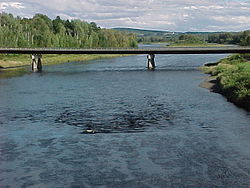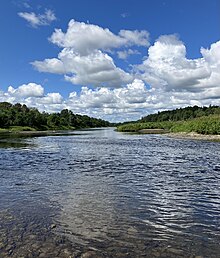Aroostook River
| Aroostook River | |
|---|---|
 Aroostook River at Washburn, Maine | |
 Aroostook River watershed | |
| Location | |
| Country | United States, Canada |
| State | Maine |
| Province | New Brunswick |
| Cities | Ashland, Maine, Washburn, Maine, Presque Isle, Maine, Caribou, Maine, Fort Farfield, Maine |
| Physical characteristics | |
| Source confluence | Millinocket Stream and Munsungan Stream |
| • location | Maine Township 8, Range 8, WELS, Penobscot County, Maine |
| • coordinates | 46°20′40″N 68°48′04″W / 46.3445°N 68.8011°W |
| Mouth | Saint John River (New Brunswick) |
• location | Aroostook, NB |
• coordinates | 46°48′36″N 67°42′58″W / 46.810123°N 67.71620°W |
• elevation | 330 ft (100 m) |
| Length | 112 mi (180 km) |
| Basin size | 2,442.7 sq mi (6,327 km2) |
| Discharge | |
| • location | Masardis, Maine |
| • average | 1,506 cu ft/s (42.6 m3/s) |
| • minimum | 41 cu ft/s (1.2 m3/s) |
| • maximum | 29,500 cu ft/s (840 m3/s) |
| Discharge | |
| • location | Washburn, Maine |
| • average | 2,696 cu ft/s (76.3 m3/s) |
| • minimum | 75 cu ft/s (2.1 m3/s) |
| • maximum | 49,500 cu ft/s (1,400 m3/s) |
| Watershed data.[1] | |
The Aroostook River is a 112-mile-long (180 km)[2] tributary of the Saint John River in the U.S. state of Maine and the Canadian province of New Brunswick. Its basin is the largest sub-drainage of the Saint John River.[3]
The name is derived from the Malecite name Wool-ahs-took, translated by Ganong as "good river for everything". It appears as Arassatuk (DeRozier, 1699).[4]
History
In the late 1830s, the territory comprising the river's drainage area was the scene of the Aroostook War, a boundary dispute between the United States and the United Kingdom.[citation needed]
Geography
The river rises in northeastern Maine from the confluence of Millinocket Stream and Munsungan Stream in Maine Township 8, Range 8, WELS, in northern Penobscot County. The river winds east and northeast through Aroostook County. It runs through Ashland, and passes north of Presque Isle and east of Caribou. It joins the Saint John River in Aroostook, New Brunswick, 2 miles (3 km) after crossing the Canada–United States border.[citation needed]
The United States government maintains two river flow gages on the Aroostook. The first is located near Masardis, Maine (46°31′21″N 68°22′23″W / 46.52250°N 68.37306°W) where the rivershed is 892 square miles (2,310 km2). The second is at Washburn, Maine (46°46′36″N 68°09′29″W / 46.77667°N 68.15806°W) where the rivershed is 1,654 square miles (4,280 km2). By Fort Fairfield, Maine the rivershed is 2,301 square miles (5,960 km2). At Masardis, the maximum recorded flow is 29,500 cubic feet per second (840 m3/s) and the minimum 41 cubic feet (1.2 m3) per second.[5] At Washburn, the maximum recorded flow is 49,500 cubic feet (1,400 m3) per second and the minimum 75 cubic feet (2.1 m3) per second.[6] Annual maximum flows occur during the spring snow melt and minimums in the fall. The highest flood levels at both gages occurred during ice-dam induced floods, which occur relatively often on this river. Such flooding occurred in March and April 1999, April and May 2003, and April 2004.[7]
The International Appalachian Trail runs along the river for several miles. Hikers cross the river, pass through customs, and cross the international boundary at Fort Fairfield, Maine.[8]

Nature
The river has a small run of Atlantic salmon. From 1998 to 2001, the number of adults returning to the river ranged from seventeen to thirty.[9]
See also
References
- ^ University of Maine. "Watershed Overview and Data Access: Aroostook." Watershed Code 01010004. Accessed 2010-02-17.
- ^ U.S. Geological Survey. National Hydrography Dataset high-resolution flowline data. The National Map Archived 2012-03-29 at the Wayback Machine, accessed June 22, 2011
- ^ Gibbs, K. Elizabeth; Bradeen, Billie; Boland, Dan (September 2004). "Spatial and Temporal Segregation Among Six Species of Coexisting Ophiogomphus (Odonata: Gomphidae) in the Aroostook River, Maine". Northeastern Naturalist. 11 (3): 295–312. doi:10.1656/1092-6194(2004)011[0295:SATSAS]2.0.CO;2. ISSN 1938-5307. JSTOR 3858420.
- ^ Hamilton, William (1978). The Macmillan Book of Canadian Place Names. Toronto: Macmillan. p. 70. ISBN 0-7715-9754-1.
- ^ U.S. Geological Survey (2008). "01015800 Aroostook River Near Masardis, ME" (PDF). Water-Data Report 2008. Archived (PDF) from the original on 2017-04-28. Retrieved 2010-02-17.
- ^ U.S. Geological Survey (2008). "01017000 Aroostook River at Washburn, ME" (PDF). Water-Data Report 2008. Archived (PDF) from the original on 2017-04-28. Retrieved 2010-02-17.
- ^ Hom, V.T.; Capone, E.J.; Econopouly, T.W. (2004). Forecasting Ice-Affected Rivers at the Northeast River Forecast Center (PDF). 61st Eastern Snow Conference. pp. 191–194. Archived from the original (PDF) on 2007-09-27. Retrieved 2006-05-07.
- ^ "The International Appalachian Trail in Maine". The International Appalachian Trail in Maine. Archived from the original on 2006-04-08. Retrieved 2006-05-07.
- ^ Kircheis, Frederick W. (2002). Report of the Maine Atlantic Salmon Commission to the Maine Legislature Fisheries and Wildlife Joint Standing Committee for the period January through December 2001 (PDF) (Report). Maine Atlantic Salmon Commission. Archived from the original (PDF) on 2006-05-21. Retrieved 2006-05-07.
External links
- USGS real-time river flow data at Washburn, Maine or Masardis, Maine. (Masardis also has air temperature.)
- See a panorama of the Aroostook River at Washburn
- National Weather Service forecast of river levels and flow.
- Real Time Aroostook River WebCam.
- "Aroostook River". Geographic Names Information System. United States Geological Survey, United States Department of the Interior. 30 September 1980. Retrieved 2009-10-22.
